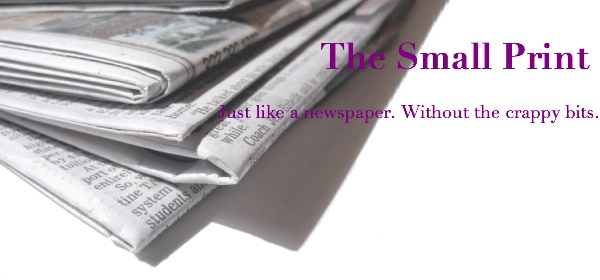Linda Jaivin "signing" a book
There's a scene in the film National Treasure 2 where author Riley Poole peeks out hopefully from behind stacks of books at his own book signing. Except for an old man who waves vaguely to him, he sits there unnoticed until a girl approaches him and asks, “Are you Benjamin Gates?”
It’s not easy to be at a book signing. But when it’s an empty house, it’s even worse.“You’re always full of dread when you go to a book signing that you’ll embarrass yourself and the bookshop,” says David Dale, co-author of Soffritto – A Ligurian Memoir with Lucio Galletto. “You’ll be sitting there and half an hour goes by and you can see the sales assistants thinking, ‘This bloke’s a complete dud’.”
In a perfect world, at each book signing there would a reasonably long line of people. Why? Signed books equal money. “You can’t return signed books,” says Victoria Tomkinson, publisher for Linda Jaivin, author of The Infernal Optimist. “Out there with your sharpie, that’s money in your pocket.”
“Every author knows that,” Jaivin chimes in.
“Some writers have lots of people, other writers have hardly anyone - and when that's you, it brings back memories of adolescent rejection,” says Catherine Coles, author of The Poet Who Forgot.
Or worse, it reflects on the author’s bad performance. Chief queue wrangler for the Sydney Writers Festival, Morgan Smith, says that a long queue for book signings by authors is a measure of how well they captivate their audience at Festival events.
“Obviously,the big name overseas authors [have long queues] but also those who talk really well about their books and ideas,and somehow capture the imagination of the audience,” she explains.“You can always tell the writers who have been really good by the length of the queue.”
"But there’s a downside to popularity. “My hand doesn’t get tired,” says Dale. “My problem is to think of something to write.”
Jaivin says she has a way around this: “At the launch of my first novel, the comic erotic Eat Me, I came up with the idea of kissing someone’s book to leave a big red lip print.It must have been the champagne talking. Anyway,after that,everyone wanted a kiss on their book.”
“Because I had to keep refreshing my lipstick, I went through nearly the entire tube on the one night. Kissing copies of Eat Me became something of a tradition and I still do it when people ask – and occasionally when they don’t.” Was it worth it? “I never begrudge people my kisses. In case any other authors thinking of taking this up, I have one thing to say: matte works better than gloss.”
At least a kiss is simple – fans often struggle to understand what the author wrote. But sometimes this is deliberate.
“One time, I recall beginning a dedication and then realising I was less than 100 per cent sure how to spell a key word in it,” says Mark Tredinnick, poet and author of The Little Red Writing Book. “Fortunately for me, my writing is close to illegible, and I made sure it was at its least clear for the word in question.”
Jillian Rice, at lunch with Dale and Galletto, doesn’t seem to mind the near-illegible writing and says she always gets a book signed if she can. “I feel it gives me a personal connection to the author.” On the other hand, Roger Kerr, also at the lunch, doesn’t particularly care about a signature.
Rather, he uses the opportunity to engage in one-on-one conversation with the author. “I get them in on an unusual question,” he says slyly. “I like to ask them a question they don’t expect. The book signing is irrelevant, it’s more about the talking. I’m curious as to what sort of person the author is.”
Morgan Smith frowns on this. “The main problem in signing queues is when people want to tell the author their life story or give a long critique. “Ask for [your] book to be signed, keep the chat down to a nice compliment – ‘I loved your last book and I’m really looking forward to reading this.’”
“It’s very interesting,” says Dr Stephen Juan, Sydney University anthropologist and author of the Odd books series. “If the author is famous and the person has read several of their books, the reader already has a relationship with the author but the author does not know the reader at all.
“It’s a one-way relationship and it’s easy for a reader to be offended … because they just don’t understand the author doesn’t know them.”
For all the pitfalls, one rule seems simple: have a book by the author for the author to sign. Steve Toltz, author of A Fraction of the Whole, recalls: “At one signing, someone gave me the Burroughs book Naked Lunch to sign. I signed as William Burroughs.
Pic: courtesy of the supremely awesome Kris Lapez whom I am very much indebted to.









5 comments:
aww i loved this article. Did you go to the Sydney's Writers festival for some articles, like Bonnie?
I love the topics you chose :) Wally, and now book signings
:P
lol.. this sounds better the mathematic of queue theory that you got me interpreting for you xPP
i think writer's must have this innate fear of people not caring/knowing about them. i went to margot saville's event today, (the woman who wrote about maxine mckew's win in bennelong) and the first thing she says is "can I just say...I had a completely sleepless night last night, it may have been helped by the glass of wine i had, but I just had this terrible dream that no one came today" and everyone was like AWWWWW.
hahaha but reading your article made me realise that they must be incredibly insecure about the reception of their writing
Amy - Thanks! Yes I did, I stalked quite a few authors after their events :P but only went to one actual event, haha. And I didn't choose the topic, I was commissioned to do it and I did the wrong topic anyway :(
Henry - I don't know what you're on about - personally I think that being able to calculate how long people will line up for is the most fascinating thing in the world.
Bonnie - haha yeah well a few of them have actually had it happen to them :P
hehe reminds me of the book signing you went to, where there was no one =S
It's a tough life for writers...
Post a Comment